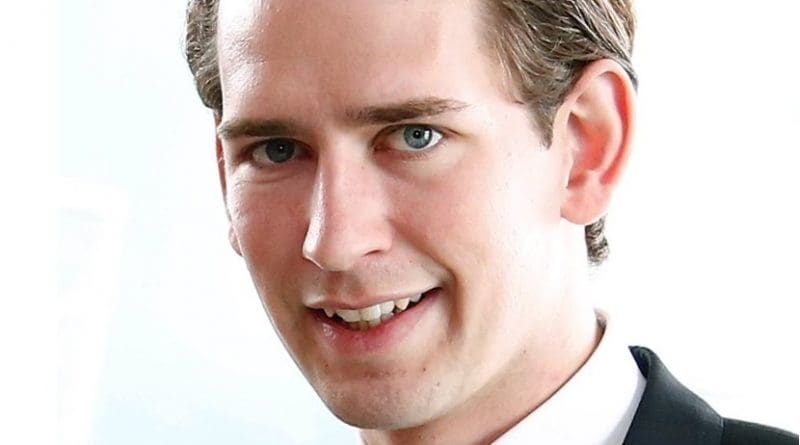Once Again, Europe’s Bigots Are On The March – OpEd
By Arab News
By Yossi Mekelberg*
If any part of the world should be worried and aware of the dangers of populist ultra-nationalism it is Europe. If any country in Europe should be worried and aware of the acute threat of populist ultra-nationalism it is Austria (and Germany, obviously).
Only a few weeks ago the election results in Germany caused great concern across the continent and beyond. To see the far-right Alternative for Germany (AfD) party win 12.6 percent of the vote and enter the Bundestag for the first time was to witness a watershed in post-Second World War Europe. Soon to follow suit, and with even more alarming results, was the commanding victory of the radical nationalist parties in the Austrian elections, which eclipsed the electoral outcome in Germany. Between them, Austria’s so-called center-right People’s Party (ÖVP) that gained 31.5 percent of the vote, and the ultra-right Freedom Party (FPÖ) that took 26 percent, are going to set the agenda for the next four years — and it is a xenophobic-chauvinistic one.
Though Austria is a small country with a population of a mere 8.5 million, such a decisive victory for two parties whose campaigns concentrated on outbidding each other over who was more anti-immigration and Islamophobic, and more generally bigoted, is chilling. These results legitimize a vile and opportunistic ideology that has already taken hold on the political margins of other European countries, giving it a strong and frightening tailwind as it creeps into the mainstream of European politics. It is an additional and severe headache for Brussels, which is already struggling to come up with answers to the rightward shift of countries such as Britain on its way out of the EU, and the emergence of nationalist movements in countries such as Germany, Poland or Hungary as major political forces to be reckoned with.
To refer to the ÖVP, led by 31-year-old Sebastian Kurz, as center-right is misleading. It might be the case that the FPÖ is more upfront about and explicit in its far-right ideology, but the difference between them is mainly in presentation, not substance. The FPÖ’s leader Heinz-Christian Strache pledged to prevent Austrians from “becoming a minority in our own homeland.” But in what way is Kurz, who called for a ban on Muslim kindergartens, similarly to the FPÖ, and advocated a “burqa ban,” and a law against foreign funding of mosques, any different? It was part of his campaign for tougher measures against what he calls “political Islam,” which for him means any expression of the Muslim faith and its traditions.
Putting the disappointment and trepidation caused by the outcome of its elections aside, we probably shouldn’t be surprised at the rise of the far-right in Austria. The permissive international environment is evidently creating fertile ground for these types of movement, but in the Austrian case there is also a strong sense of deja vu, several times over. It is not just its history during Nazi times in the 1930s and 1940s, but the complete and utter state of denial this nation has adopted about its active and willing collaboration with Nazi Germnay in executing the most heinous of atrocities during those times. Austrians have always falsely portrayed themselves as victims rather than what they really were — perpetrators. In 1986 Austria elected Kurt Waldheim as its president, despite his past as a Wehrmacht officer in a Nazi intelligence unit in the Balkans. In last year’s presidential election Norbert Hofer of the FPÖ lost, but by only by a small margin.
But we shouldn’t really be surprised because Austrian voters have already expressed very similar far-right tendencies in the 1999 elections. Back then the FPÖ led by Jörg Haider won 27 percent of the vote and formed a coalition with the ÖVP. Yet despite vehement protestations by the European Parliament, diplomatic sanctions by the EU for a short while, Israel recalling its ambassador, and the US contemplating following suit, this coalition of hate survived for almost five years.
It remains to be seen whether Kurz will opt to form a coalition with the like-minded Strache FPÖ, or with the Social Democratic Party (SPÖ) that has been in power for the past decade. Kruz is not short of self-confidence, and his gamble on nationalist incitement paid off at the ballot box. Despite Kurz’s success, Strache is the one in position to become the kingmaker with an option to form a coalition with the SPÖ, as unlikely as it sounds.
The Austrian people have had their say, but now it is for the international community to express its revulsion and rejection of any government in Vienna that includes the Freedom Party or adopts a policy that is blatantly anti-immigrant and xenophobic.
However, unlike 17 years ago when the occupant in the White House was Bill Clinton and in Europe far-right parties were confined to the very margins of politics, now on both sides of the Atlantic they have crept into the mainstream. The results of the Austrian elections, unlike those of 1999, are no longer a European anomaly. It is an old-new discourse, which has haunted this continent for centuries. It proves wrong those who thought that it was eradicated in a bunker beneath the Reich Chancellery in 1945, with the Nuremberg trials that followed the end of the Second World War, or with the formation of an enlightened, liberal European Union. It is alive and kicking, and once again Austria is playing its part in it.
• Yossi Mekelberg is professor of international relations at Regent’s University London, where he is head of the International Relations and Social Sciences Program. He is also an associate fellow of the MENA Program at Chatham House. He is a regular contributor to the international written and electronic media. Twitter: @YMekelberg

